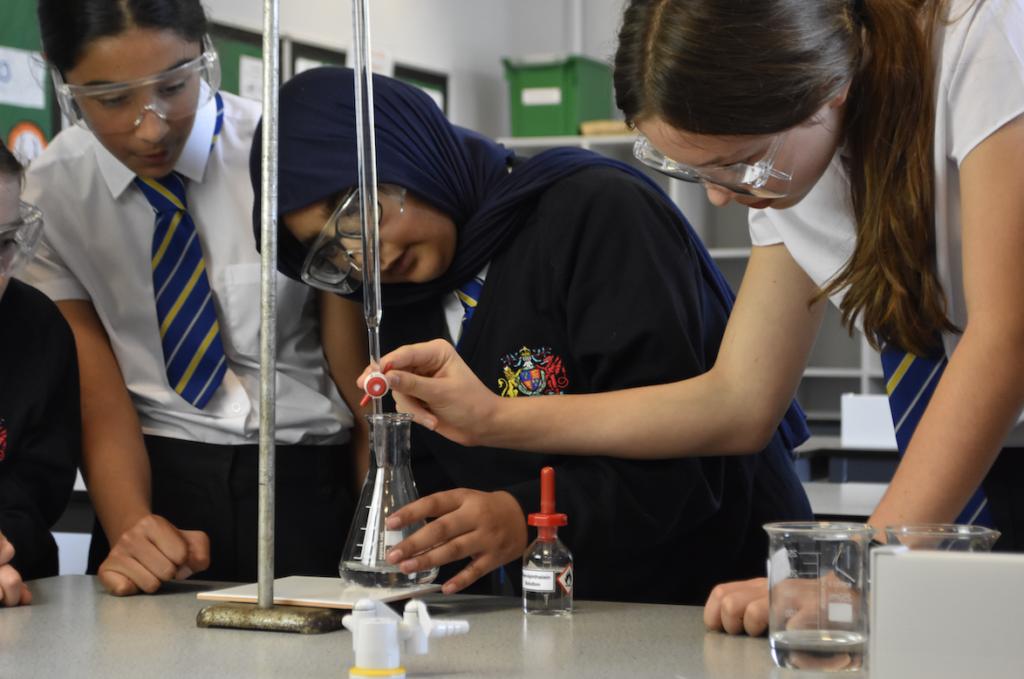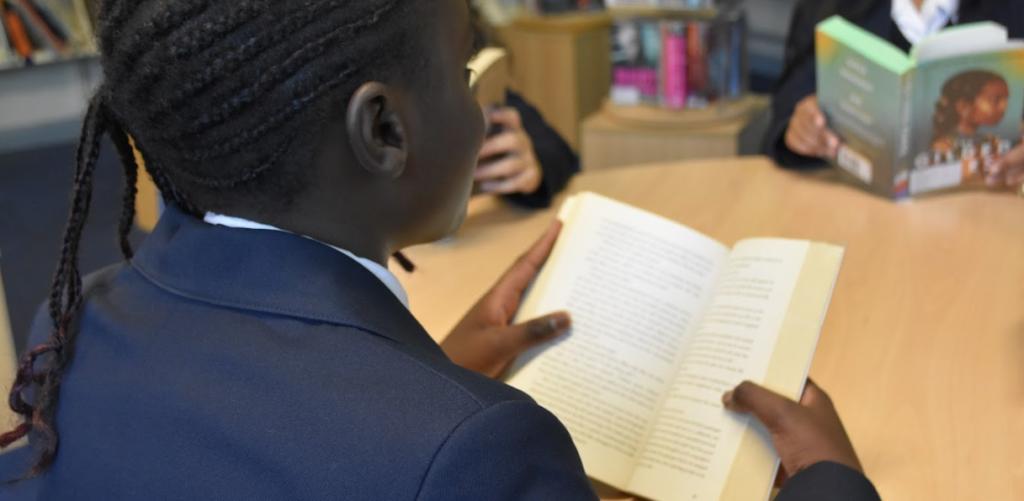At Key Stage 4, all students, except under rare circumstances, are prepared and entered for both GCSE English Language and GCSE English Literature. As such, we cover both AQA English Language papers – Paper 1: Explorations in Creative Reading and Writing, and Paper 2: Writers’ Viewpoints and Perspectives – and each of the set texts for the AQA English Literature course. Our students study ‘Jane Eyre’ (19th century novel), ‘Macbeth’ (Shakespeare play), ‘An Inspector Calls’ (20th century drama) and the ‘Power and Conflict’ cluster of anthology poems, including pieces by renowned poets like Tennyson, Hughes, Blake, Agard, Armitage and Duffy. We also expose students to a range of previously unseen poetry to prepare them for this section of the Literature exam.
For GCSE English Language, students will sit two examinations: Paper 1 requires them to read and answer questions on extracts from twentieth and twenty-first century fiction, before producing a piece of their own creative (descriptive or narrative) writing; Paper 2 assesses how well students are able to identify viewpoints in one twenty-first century and one nineteenth century non-fiction source, before testing their ability to write to present their own point of view on a particular topic.
For GCSE English Literature, there are also two examinations, with Paper 1 testing students’ understanding of Shakespeare’s ‘Macbeth’ and Brontë’s ‘Jane Eyre’, and Paper 2 assessing their ability to analyse Priestley’s ‘An Inspector Calls’ and compare two of the studied ‘Power and Conflict’ poems. On this second paper, students will also have to analyse an unseen poem, as well as commenting on similarities and differences between it and a second unfamiliar piece of poetry.
Year 10
Autumn Term
1: Modern drama (Literature Paper 2) – ‘An Inspector Calls’
In Year 10, we begin by studying ‘An Inspector Calls’, for GCSE English Literature, exploring the social, cultural and historical context of the play – including J. B. Priestley’s background and views, socialism, capitalism and the impact of the First and Second World Wars on society – and how it relates to the action and messages of the play itself. This modern drama links effectively with the text that students explored at the end of Year 9 – ‘Blood Brothers’.
2: English Language Paper 1: Explorations in creative reading and writing
Upon completion of the play, students are exposed to English Language Paper 1, ‘Explorations in Creative Reading and Writing’, with extracts from ‘Jamaica Inn’, ‘The Buddha of Suburbia’, ‘A Thousand Splendid Suns’ and ‘Lord of the Flies’ used to stimulate discussion. Students read the extracts, inferring meaning and analysing writers’ techniques.
Spring Term
1: Shakespeare’s ‘Macbeth’ (Context and Acts 1-2) – Literature Paper 1
We explore the key social, cultural and historical context of Shakespeare’s ‘Macbeth’, including the significance of the Gunpowder Plot, religion, the Great Chain of Being and witchcraft. Students then read and analyse Acts 1 and 2 of the play, exploring Shakespeare’s techniques and explaining effects on his audience, as well as relating ideas to the play’s context.
2: Shakespeare’s ‘Macbeth’ (Acts 3-5) – Literature Paper 1
In the latter half of the Spring Term, students complete the play (covering Acts 3, 4 and 5, as well as revising key characters, ideas, messages and themes), but not before they have looked at the writing section of Language Paper 1. Here, students learn about effective, imaginative and ambitious linguistic and structural techniques in order to hone their creative writing skills, practising both descriptive and narrative written styles.
Summer Term
1: Poetry Anthology (‘Power and Conflict’) and Unseen Poetry – Literature Paper 2
Towards the end of Year 10, students cover the majority of the ‘Power and Conflict’ poems from the AQA anthology (for the GCSE English Literature course), exploring the context, language, form and structure of each poem and considering thematic and technical links between each. We also read a range of previously unseen poems in order to prepare students for this section of the English Literature exam.
2: English Language Paper 2: Writers’ Viewpoints and Perspectives (Reading and writing) – as well as preparation for the Spoken Language Study
In the second-half of the Summer Term, we introduce students to the second GCSE English Language paper. We read a variety of extracts of non-fiction, from twentieth, twenty-first and nineteenth centuries, that cover such themes as gender equality, education and homelessness. In the reading section, students’ focus is on identifying, and comparing, writers’ viewpoints and perspectives based on textual evidence, whilst the writing section gives students the opportunity to accurately and imaginatively express their own point of view on a particular topic. Students are also introduced to the Spoken Language Study component of GCSE English Language course.
Year 11
Autumn Term
1: An Inspector calls’ (literature Paper 2) Language Paper 2: Writers’ Viewpoints and Perspectives Unseen Poetry
In the first-half of the Autumn Term of Year 11, students finish studying ‘An Inspector Calls’, which they began to read and analyse at the end of Year 10. They subsequently move on to study the second of the English Language papers, focusing on Writers’ Viewpoints and Perspectives, having studied Language Paper 1 in Year 10.
2: ‘Power and Conflict’ poetry and Unseen Poetry and Spoken Language Study
Once they have finished their first mock examination of Year 11, in early November, students complete their Spoken Language presentations. They will then proceed to finish the ‘Power and Conflict’ poetry anthology, analysing the remaining poems not already covered last year, before exploring some more examples of Unseen Poetry – previously unstudied poems.
Spring Term
1: Revision of English Language Paper 1 (Explorations in Creative Reading and Writing)
By this point in Year 11, students will have covered all of both the English Language and English Literature courses – but they won’t have seen English Language Paper 1 since the Autumn term of Year 10, so this is a vital opportunity to revisit the knowledge required for that paper. We explore extracts from ‘Wide Sargasso Sea’, ‘The Five People You Meet in Heaven’ and ‘Birdsong’, exploring how writers use language and structure as well as fine-tuning creative writing skills.
2:
Revision of English Literature Paper 1 (‘Macbeth’ and ‘Jane Eyre’)
In the second-half of the Spring Term, we turn our attentions towards revision of English Literature Paper 1 – specifically the Shakespearean play, ‘Macbeth’, and 19th century novel, ‘Jane Eyre’. We revisit key quotations and themes, exploring Shakespeare’s and Brontë’s methods and intentions as well as key links to social, cultural and historical context.
Summer Term
1: Revision of all papers
Before the Year 11 students leave, and the GCSE examination period begins, we revise all components – Language Papers 1 and 2, and Literature Papers 1 and 2. Students will have plenty of opportunities to complete practice assessments in preparation for both their GCSE English Language and English Literature examinations.
Assessment at Key stage 4
Both the GCSE English Language and GCSE English Literature courses are assessed by 100% terminal examination at the end of Year 11. There are two examinations for English Language and two examinations for English Literature.
Throughout Year 10 and Year 11, students will sit one summative assessment per half-term. This will be directly related to the topic or scheme of work for that half-term, and will take the form of an AQA GCSE-style examination question: for instance, if students are studying ‘Jane Eyre’, then their assessment for that half-term will be an extract question that asks students about Brontë’s presentation of a character or theme in this extract and the novel as a whole.
At the end of Year 10, students will sit mock examinations, usually one English Language paper and one English Literature question (either based on ‘Macbeth’ and ‘Jane Eyre’), that help to inform teaching at the start of Year 11.
Year 11 will have two separate mock examination periods, with one coming in the second half of the Autumn term (November) and one in the second half of the Spring term (February/March). In these mock exams, students will cover one English Language paper and one English Literature paper; for the second round of mock examinations, students will sit the second paper for each course.
How can parents help support their child’s learning?
The CGP revision guides for both GCSE English Language and GCSE English Literature are excellent, providing a comprehensive and accessible summary of key content and essential skills and knowledge required for both courses. In addition, Pearson has published a ‘Revise AQA GCSE English Language’ workbook that is another invaluable and impressively supportive resource to help KS4 students to prepare for their English Language examination. In terms of the English Literature set texts, various companies – including CGP – provide guides, including detailed annotations and analysis of key quotations, to ‘Macbeth’, ‘Jane Eyre’, ‘An Inspector Calls’ and the poetry component of English Literature Paper 2.
Enrichment opportunities
Every Thursday, after school, the English department runs an English study club, which all Year 11 students are invited – and, indeed, actively encouraged – to attend. This weekly session aims to build students’ confidence in their reading, writing and speaking, as well as allowing them additional time to prepare for their examinations. Whilst this club is primarily aimed at Year 11 students, it is also open and available to Year 10.
We also strongly encourage KS4 students to participate in the ‘Loudspeaker’ magazine, since it is another means of developing their confidence and imagination in written expression. Since the magazine was established in 2020, Year 10 and 11 students have actually contributed more written articles, poems and stories to the publication than any other year groups.
The school library is also open every day until 4.00pm, and KS4 students are welcome to attend, either simply to read for pleasure or to revise for their GCSE English Language and English Literature examinations.
GCSE course/s (exam board and code)
https://www.aqa.org.uk/subjects/english/gcse
AQA GCSE English Language (8700)
AQA GCSE English Literature (8702)
![]()



